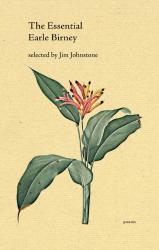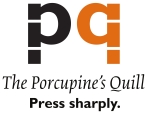
The Essential Earle Birney presents a wide-ranging selection of the celebrated Canadian poet’s most memorable verse.
About the Book
Over the course of a career spanning five decades, Canadian poet, novelist and playwright Earle Birney produced some of Canada’s best-known poems. The Essential Earle Birneycontains a selection of his pivotal works, including early break-out successes; nuanced, mid-career lyrics; avant-garde experiments; and beautiful, deceptively simple love poetry. From ‘David’ to ‘Bushed’ to ‘Anglo-Saxon Street’, this indispensable collection reaffirms Birney’s position as a key figure in modern Canadian poetry.
The Essential Poets Series presents the works of Canada’s most celebrated poets in a package that is beautiful, accessible, and affordable. The Essential Earle Birney is the 10th volume in the series.
Read an Excerpt
From the Introduction
In The Creative Writer (1966), a collection of lectures that Birney prepared for the CBC, the poet asserted: "Living art, like anything else, stays alive only by changing."1 His poetry reflects this statement—Birney made significant edits to many of his most canonized pieces throughout his career, despite criticism. Birney’s Selected Poems (1966) can be seen as something of a sea change in this regard: nearly every poem in the book was reformatted to remove punctuation, with the notable exception of ‘David’. The grammatical and typographical changes that began in Selected Poems were refined further in The Collected Poems of Earle Birney (1975), and it’s from this point forward in Birney’s bibliography that the poems in this volume have been chosen.
The transformation of Birney’s work in the 1960s and 1970s was accompanied by a reevaluation of his poetics. He addressed this in the preface to Ghost in the Wheels: Selected Poems (1977), when he wrote: "I should say at the start that I don’t any longer like the words "poet," "poems," etc. They’ve developed pretentious connotations. I prefer "maker" and "makings." They mean the same but the texture’s plainer, oatmeal, not manna."2 Far from being an idiosyncrasy, the removal of rhetorical and syntactic markers in Birney’s work corresponds with his desire for "indefinitely delayed communication."3 While this was considered unnecessary at the time, today the ambiguity created by Birney’s editorial changes charge the general reader with discovery, and reward open-ended interpretations of his poems by creating enjambments that mimic song.
Despite the fact that the poems chosen in The Essential Earle Birney are retroactively stylized in a manner that unifies them, chronology is significant when considering Birney’s output. A meticulous record-keeper, the poet kept track of the date of initial composition and completion of all his work. This record is helpful when tracing Birney’s development in relation to his contemporaries, and the poems in this volume are arranged chronologically to allow for juxtaposition while also establishing the trajectory of Birney’s writing life. Some of his most radical poems, written during a period of linguistic experimentation that saw him align with the avant-garde in the late 1960’s, benefit from comparison with poets of that era.
While Birney never abandoned his experimental instincts, he devoted much of his last 20 years to writing a sequence of extraordinary love poems for his partner, Wailan Low. Represented here by ‘She Is’, ‘On her twenty-sixth’, ‘coming back from the airport’ and ‘my love is young’, his final poems are remarkable for their directness, honesty, and deceptive simplicity. A synthesis of Birney’s playful nature and technical mastery, the poems for Wailan distill the youthful exuberance of their relationship in intensely personal terms. More than anything else he wrote, these lyrics capture Birney unguarded, and they provide a fitting epilogue to one of the most diverse bodies of work of the 20th century.
—Jim Johnstone
Notes
1. Birney, Earle. The Creative Writer. Toronto: Canadian Broadcasting Corporation, 1966. Print.
2. Birney, Earle. Ghost in the Wheels: Selected Poems. Toronto: McClelland & Stewart. 1977. Print.
3. Milton Wilson. "Poet Without a Muse." A Salute to Earle Birney. Spec issue of Canadian Literature 30 (1966): 14-20. Print.
Praise for The Essential Earle Birney
The tropes that appear in Birney’s poetry are both quietly political and overtly sincere, experimental and traditionally sound. It isn’t an easy feat for a poet to develop and change as he did, and if his work is to survive and be collected, it should be acknowledged as living, for as Birney stated, "Living art, like anything else, stays alive only by changing."
—Kenny Jakubas, Foreword Reviews
About the Author

Earle Birney was a poet, novelist, and playwright whose experimental instincts drove him to create some of Canada’s most diverse and recognizable poetry, including the oft-anthologized ‘Anglosaxon Street’, and ‘David’, which is often considered the most popular Canadian poem of all time. Born in Calgary, Alberta, Birney was raised on a farm before embarking on an academic career, attending the University of British Columbia, the University of Toronto, the University of California, Berkeley, and the University of London, where his interest in Old and Middle English led to a reputation as an accomplished scholar of medieval literature. After serving as a personnel officer in WWII, Birney took a professorship at the University of British Columbia, where he spent twenty years travelling, writing, and teaching. In 1965, Birney became the first Writer in Residence at the University of Toronto, mentoring new, up-and-coming poets and branching out into new and experimental forms.
Birney died in Toronto in 1995 after an impressive career spanning several decades, over twenty books of poetry, two Governor General’s Awards, and several plays, novels, short stories, and works of non-fiction.
About the Editor

Jim Johnstone is a Canadian writer, editor, and physiologist. He is the author of four books of poetry: Dog Ear (Véhicule Press, 2014), Sunday, the locusts (Tightrope Books, 2011), Patternicity (Nightwood Editions, 2010) and The Velocity of Escape (Guernica Editions, 2008), as well as the subject of the critical monograph Proofs & Equational Love: The Poetry of Jim Johnstone by Shane Neilson and Jason Guriel. He has won several awards including a CBC Literary Award, Matrix Magazine’s LitPop Award, The Fiddlehead’s Ralph Gustafson Poetry Prize and This Magazine’s Great Canadian Literary Hunt. Currently, Johnstone is the Poetry Editor at Palimpsest Press, and an Associate Editor at Representative Poetry Online.
You Might Also Like
Buy in Print
To get this book in print, order from your favourite indie bookseller, or
buy online from our distributor, UTP »
